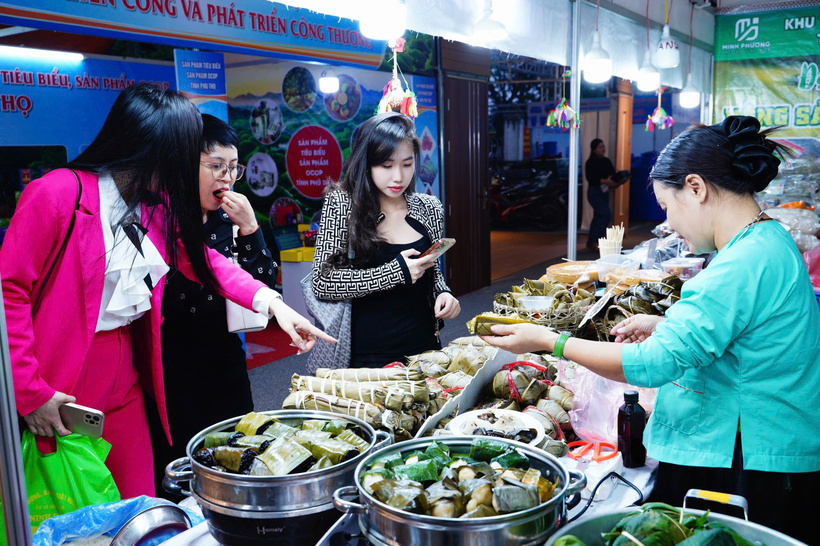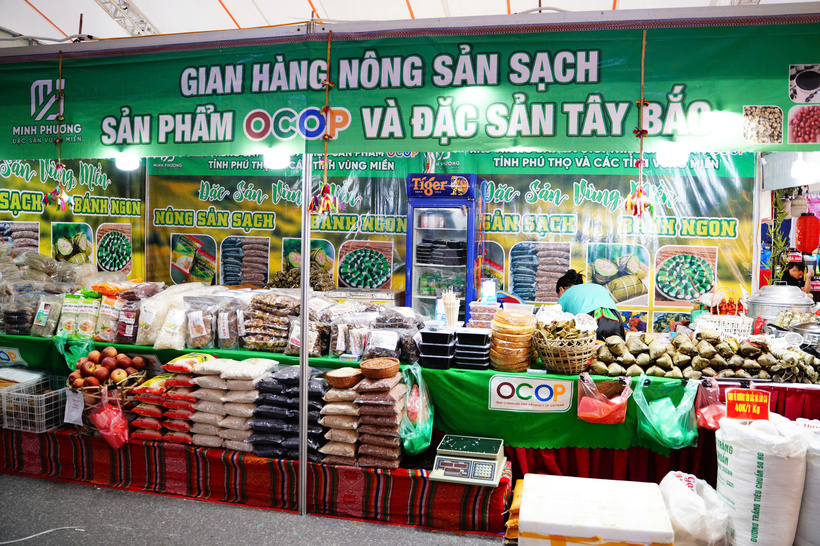
MoIT proposes measures to curb impact of Middle East conflict
19:05 | 23/03/2025 16:05 | 03/03/2026News and Events
From small stalls to big aspirations
Amid the hundreds of booths at the 2025 Red River Delta Trade Promotion and Supply-Demand Connection Fair, the booth of the Phu Tho Safe Agricultural Products and Cake Processing Cooperative drew large crowds of visitors. The simple yet appealing display featured cassava cakes, phuc cakes, and fermented pork rolls, each embodying the rich culinary traditions of Vietnam’s midland region. Every product told a story about the diligence of ethnic minority farmers and their determination to preserve traditional crafts in a rapidly modernizing world.

The booth of Phu Tho Safe Agricultural Products and Cake Processing Cooperative, led by Director Nguyen Thi Ninh Phuong, attracts a large crowd of visitors at the 2025 Red River Delta Trade Promotion and Supply-Demand Connection Fair.
“Coming to the fair, we’re not only showcasing specialties from Phu Tho but also introducing products from other regions, such as banh chung from Ha Giang, banh bo from Cao Bang, and banh te from Son Tay,” said Nguyen Thi Ninh Phuong, Director of the cooperative. “I hope our small booth can become a bridge to help ethnic specialties from mountainous provinces reach a wider audience.”
Beyond displaying products, the cooperative created a culinary experience corner featuring dishes like bamboo rice with lemongrass salt and grilled pork, allowing visitors to enjoy authentic highland flavors. Each dish, though simple and rustic, was infused with pride, craftsmanship, and the resilient spirit of local people.
In Phuong’s bright eyes, one could see the aspiration of rural women seeking a new direction: preserving cultural identity while taking charge of their own economic future through trade promotion and digital transformation.
For years, trade promotion has been a crucial driver helping ethnic minority agricultural products establish a foothold in the market. Through trade fairs, business-matching events, and supply-demand connection programs, cooperatives and small producers from mountainous areas have gained access to urban consumers, laying a solid foundation for expanding production.
“Joining trade fairs allows us to promote, connect, and sell much more effectively than retailing at home,” Phuong said. “After each event, businesses and retailers often contact us for long-term orders, which helps sustain our production throughout the year.”
Indeed, trade promotion programs organized by the Ministry of Industry and Trade, the Vietnam Trade Promotion Agency, and local Departments of Industry and Trade have yielded clear results. Beyond generating immediate sales, they have helped cooperatives learn valuable skills in product display, marketing, and brand storytelling. Many have shifted from small-scale production to value-chain models, focusing on packaging, labeling, and traceability, practices that were once unfamiliar to ethnic minority producers.

Visitors explore and purchase highland specialties at the Phu Tho cooperative’s booth, enjoying traditional flavors and experiencing local culinary culture.
Trade promotion has also sparked creativity and a spirit of integration. Standing alongside hundreds of booths from across the country, highland producers become more aware of both their strengths and limitations, motivating them to adapt. As Phuong put it, “Every trade fair is an opportunity for us to learn about packaging and how to tell the story behind our products in a way that resonates with buyers.”
For highland cooperatives, a booth at a trade fair is not just a place to sell goods, it’s a platform to affirm capability and pride. When local producers confidently present their products in major cities, it symbolizes the vitality of their communities, which is rooted in cultural identity and local labor.
Bringing highland specialties to the digital space
If traditional trade promotion is the first step, digital transformation is the next, opening broader opportunities for ethnic minority products. In today’s digital economy, e-commerce has become the “shortest route” connecting highland agricultural goods with consumers nationwide.
In Phu Tho, Phuong’s cooperative has pioneered selling products like fermented pork rolls, cassava cakes, and phuc cakes on domestic e-commerce platforms. Though challenges remain, it marks an encouraging shift in mindset among highland producers.
“We are present on several e-commerce platforms”, Phuong shared. “However, we face challenges such as a lack of tech-savvy staff, limited communication and order management skills. It’s all very new to us, but I believe this is the right direction”.
In reality, many mountain cooperatives still struggle to access e-commerce due to limited infrastructure, unstable internet connections, lack of devices and digital skills. Additionally, high logistics, packaging, and storage costs raise product prices and reduce competitiveness.
Therefore, for e-commerce to become a truly sustainable sales channel, strong support from the State and digital enterprises is essential. Programs such as Bringing highland specialties online, Vietnam online booths, and initiatives by the Ministry of Industry and Trade, Vietnam Post (VNPost), and Viettel Post have become vital levers helping ethnic minority products integrate into the national digital economy.

The booth showcasing cassava cakes, phuc cakes, and fermented pork rolls highlights the culinary heritage of the midland region and the cooperative’s efforts to promote ethnic minority agricultural products to a wider market.
Experts emphasize that for highland products to thrive online, three factors must align: product quality and traceability; distinctive packaging, imagery, and storytelling; and digital skills and branding training for producers.
These elements are gradually taking shape. As highland farmers learn to photograph products, write descriptions, deliver on time, and engage with customers online, digital transformation in mountain agriculture is no longer a distant concept.
Recent developments show a bright picture: ethnic minority communities are changing their mindset, embracing innovation, and stepping into the digital marketplace. However, breakthroughs require a more consistent and long-term policy framework.
Phuong added: “For cooperatives to expand their markets, we need support in packaging, labeling, traceability stamps, and funding to participate in trade fairs. These costs are often beyond the reach of small cooperatives. With targeted support policies, our products could go much further.”
The Ministry of Industry and Trade has identified trade promotion and digital transformation of agricultural products as two key pillars in developing ethnic minority economies from 2025 to 2030. National trade promotion programs are prioritizing budget allocations for small businesses, cooperatives, and producers in disadvantaged areas.
At the same time, initiatives to help producers join e-commerce platforms, in collaboration with the Ministry of Information and Communications, are enabling tens of thousands of highland farmers to gradually engage in online business.
Still, policies only become truly effective when there is close coordination among the State, businesses, and cooperatives. The State provides the legal framework and infrastructure; businesses develop distribution channels and share technology; and cooperatives serve as the central link connecting production, culture, and people.
When these elements come together, highland agricultural products are no longer just commodities, they become cultural ambassadors, embodying ethnic identity and local pride. When farmers can tell the stories behind their products, and each specialty is tied to its homeland, its value extends beyond profit, it becomes a symbol of trust and empowerment.
The story of the Phu Tho Safe Agricultural Products and Cake Processing Cooperative is a vivid example of this transformation. What once were humble village products are now showcased at national trade fairs and finding their way into the digital marketplace. It is a journey of self-reliance supported by policy, illustrating the harmony between individual effort and national vision.
As trade promotion builds bridges and digital transformation accelerates connections, highland products, from cassava roots and maize kernels to honey and handmade cakes, are no longer “remote goods” but cultural messengers bringing the soul of the mountains to consumers nationwide.

19:05 | 23/03/2025 16:05 | 03/03/2026News and Events

19:05 | 23/03/2025 16:04 | 03/03/2026News and Events

19:05 | 23/03/2025 15:18 | 03/03/2026Tourism

19:05 | 23/03/2025 14:38 | 03/03/2026News and Events

19:05 | 23/03/2025 11:24 | 03/03/2026Investment